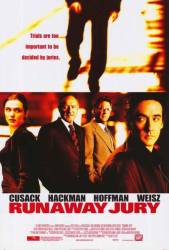Corrected entry: When Fitch's assistant is escaping from Nicholas Easter's apartment, Easter smashes the windscreen with an iron pole, but a few seconds later suddenly the windscreen is whole again. (00:55:20)
Corrected entry: Near the end when Nick and Marlee give Fitch the copy of the $15 million wire transfer and tell him he must quit or they'll reveal Fitch paid a juror, this doesn't make sense, because if they revealed the money transfer it would cause the verdict to be thrown out because one of the jurors accepted a bribe. Even if Nick isn't identified on the transfer, it still shows someone got paid. Even though the verdict went the other way, it shows the jury was tainted. It would need to be retried with a new jury.
Correction: But Fitch would still go to jail. He's not going to risk going to jail to win a case. And Nick and Marlee would still have the money to help out their town.
Corrected entry: Nick Easter is able to catch Doyle searching his apartment because the jury is dismissed early that day. However, since Fitch's group is monitoring the court room with hidden cameras, and also keeping an eye on the jurors as well, they should've had more than enough time to warn Doyle so he could get out before Nick got back to his apartment.
Correction: This is not a movie mistake, maybe a character mistake or a mistake by the team. Nowhere does anyone say we will call you if the jury gets out early. They might not even know Doyle is at Easter's apartment. Maybe he was having lunch.
Corrected entry: In the very beginning of the movie, Henry turns five years old. During the first day of the trial (when the jury and the foreman are elected), Rohr says that Henry was six years old.
Correction: It is pointed out later in the film in a speech by Dustin Hoffman that a year has passed since the shooting of Henry's father.
Corrected entry: Towards the end of the film, Rankin Fitch's private investigator, who has been investigating Nicholas Easter's background, calls Fitch and tells him he's headed to some small town in central Indiana and even gives Fitch an exit number. Wouldn't Fitch, who knows Easter has been stalking his gun cases, recognize that he once worked on a gun industry suit in a small central Indiana town?
Correction: Fitch knows that Easter has been stalking gun cases, but not Fitch's gun cases in particular. Also, Fitch doesn't remember about that particular case himself until later because he has worked many cases, not all gun related, and wouldn't recognize one particular place on that long list. It's obvious that Fitch doesn't spend much time with the locals during the movie.
Corrected entry: In the scene when Nicholas Easter enters the New Orleans courthouse for the first time it is pouring rain outside. As he stops to look up at the building, there is blue sky and a few white puffy clouds.
Correction: When he enters the courthouse for the first time (after he kvetches to his friends about jury duty) it is very much a bright, sunny day.
Corrected entry: John Cusack is beating a car with a lead pipe. Subsequent to smashing the windshield, shots alternate back and forth between a shattered and unshattered windshield.
Correction: He shatters the driver's side of the windshield with the first blow, leaving the passenger side relatively unaffected. Then he hits the windshield again and makes another bar-shaped mark next to the first one, again on the driver's side. Shots showing the driver's side are shattered, but shots on the passenger side are relatively unaffected.
Corrected entry: In the scene where towards the end of the movie when Hackman's and Hoffman's characters are in the large bathroom, just after a 3rd person tries to enter the bathroom, Hoffman "locks" the door's sliding bold, but there is no "U ring" on the door frame into which the bolt would need to slide to keep the door from opening.
Correction: Some sliding bolts don't use a "U-ring" but just slide directly into a hole drilled into the door frame.
Corrected entry: When Gene Hackman is in the men's room with Dustin Hoffman, they are arguing. Dustin Hoffman makes a statement regarding the tobacco industry, which is what the book is about, while the movie was about the rifle industry.
Correction: He doesn't say this trial is about the tobacco industry, he just refers to Rankins shoes and wonders if they are purchased with funds from "big tobacco".






Correction: This was already corrected once. Easter smashes the driver's side of the windshield, but there are very few cracks on the passenger side. He hits the driver's side again, smashing it further, but he never hits the passenger side. Car safety glass is designed so that the whole thing doesn't shatter in one blow like plate glass.
Phoenix